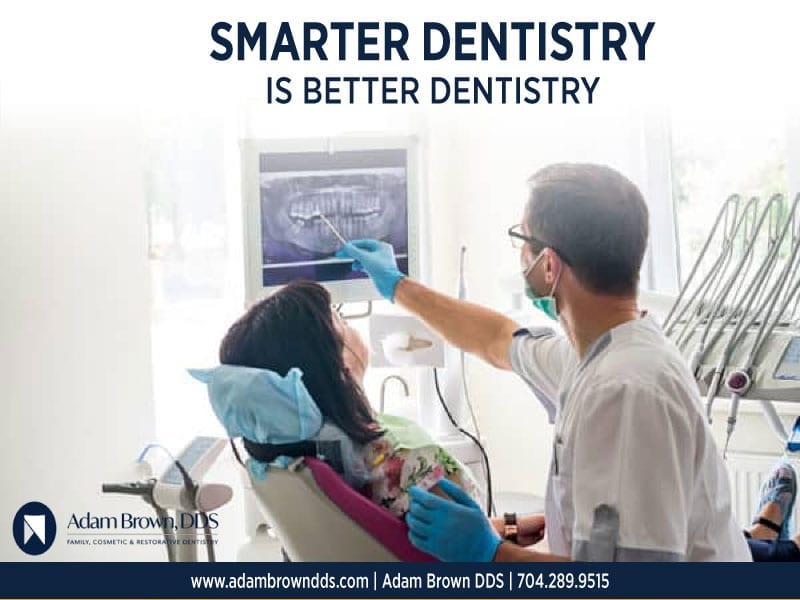Our Commitment to Ethics at Carolina’s Dental Choice
At Carolina’s Dental Choice we are strongly committed to the ethical treatment of both our staff and patients. These ethics we work and live by are the cornerstone of our business—and they are much more than a mantra to us. Our commitment to ethics can be seen each day you are in our office, and it is our hope that you are encouraged and comforted by our desire to maintain an honest and professional experience.
The American Dental Association outlines a few desired tenets to ethics for all dental offices in the U.S., and we here at Carolina’s Dental Choice follow five important principles when it comes to caring for our employees and patients:
- Patient Autonomy (self-governance)
- Nonmaleficence (do no harm)
- Beneficence (do good)
- Justice (fairness)
- Veracity (truthfulness)
Of course these sound wonderful, but exactly how we use them to interact with you on a daily basis is a little more detailed. Let’s take a closer look at each principle to see just how we use it.
Patient Autonomy
According to the ADA’s Principles of Ethics and Code of Professional Conduct document, every dentist has a duty to be truthful with patients. The document states,
“This principle expresses the concept that professionals have a duty to be honest and trustworthy in their dealings with people. Under this principle, the dentist’s primary obligations include respecting the position of trust inherent in the dentist-patient relationship, communicating truthfully and without deception, and maintaining intellectual integrity.”
To us, this doesn’t just mean we are to keep your dental records private. This also means we will keep you in the know when it comes to what is happening with your oral health. It also means you can trust us not to try and manipulate you into having procedures done that are not actually needed. Patient autonomy is the first step in building a trusting relationship.
Nonmaleficence
The ADA’s code of ethics also discusses the importance of nonmaleficence:
“This principle expresses the concept that professionals have a duty to protect the patient from harm. Under this principle, the dentist’s primary obligations include keeping knowledge and skills current, knowing one’s own limitations and when to refer to a specialist or other professional, and knowing when and under what circumstances delegation of patient care to auxiliaries is appropriate.”
You never have to worry about receiving anything but top-of-the-line, professional care at Carolina’s Dental Choice. We continually work according to the notion that if we are not completely sold on an idea, we will discuss with a fellow professional to gain clarity. This means that if we are not 100% confident of a particular procedure with a particular patient, we will not proceed. We want to best for you, and sometimes that means taking the extra time to have a conversation.
Beneficence
The American Dental Association sees benefice as
“…the concept that professionals have a duty to act for the benefit of others. Under this principle, the dentist’s primary obligation is service to the patient and the public-at-large. The most important aspect of this obligation is the competent and timely delivery of dental care within the bounds of clinical circumstances presented by the patient, with due consideration being given to the needs, desires and values of the patient. The same ethical considerations apply whether the dentist engages in fee-for-service, managed care or some other practice arrangement…”
Just ask any of our current patients and they will tell you Carolina’s Dental Choice is always working on behalf of the customer. Since our very first day in office, one of our primary goals has been to always operate for the benefit of others. This is continually our commitment you.

Justice
Though life may not be fair, Carolina’s Dental Choice is determined to treat everyone equally, as stated by the ADA’s fourth principle:
“This principle expresses the concept that professionals have a duty to be fair in their dealings with patients, colleagues and society. Under this principle, the dentist’s primary obligations include dealing with people justly and delivering dental care without prejudice. In its broadest sense, this principle expresses the concept that the dental profession should actively seek allies throughout society on specific activities that will help improve access to care for all.”
We do not discriminate or judge at CDC. We see each patient as unique and deserving of the same professional treatment we give everyone.
Veracity
Lastly, the ADA sees veracity as this:
“This principle expresses the concept that professionals have a duty to be honest and trustworthy in their dealings with people. Under this principle, the dentist’s primary obligations include respecting the position of trust inherent in the dentist-patient relationship, communicating truthfully and without deception, and maintaining intellectual integrity.”
We will never share your information with others or every give you reason not to trust us. We aim to create relationships with our customers, and a relationship built on honesty is always the best policy.

